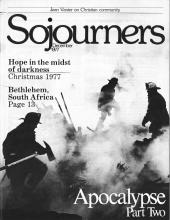Only when the Lord of history makes himself known, vindicates history in judgment, are the nations humbled ("Let the nations know they are but human," cries the psalmist, Psalm 9:20). Then doorways are opened to the elevation of the poor, the oppressed, the widowed, and the orphaned. But in apocalyptic imagination this comes about through divine intervention, even if hidden; certainly not through the saints.
Moreover, anyone who, identifying with the poor and oppressed, indulges a grim satisfaction in the apocalyptic vision has not comprehended the dimensions of apocalypse. The apocalyptic catastrophe lifts up the poor, but only by destroying the oppressive social order that is also their chief security. In the process, the poor, the saints, the oppressed perish with all the rest. Apocalypse is catastrophe. If it restores the center to the world order ("let the nations know they are but human"), it does so by a wrenching that appalls us. If it is God's justice, this justice is hidden so deeply in the mystery of suffering as to be scandalous: it is the poor, the innocent, who would be carried away in famine or nuclear holocaust while the sleek bodies of the affluent pace out their desperate hopes in well-stocked bomb shelters and hidden command centers.
In this light the terrible ambiguity of Jesus' prayer comes clear and demands a reflection in Christian action: "thy kingdom come," but "lead us not into the tribulation, and deliver us from evil." In this light we must turn to prayers of repentance and intercession. In this light, Christian activism must be stripped of its pretensions: no question here of inaugurating apocalypse, sealing thus the doom of those we pretend to help.
Read the Full Article

